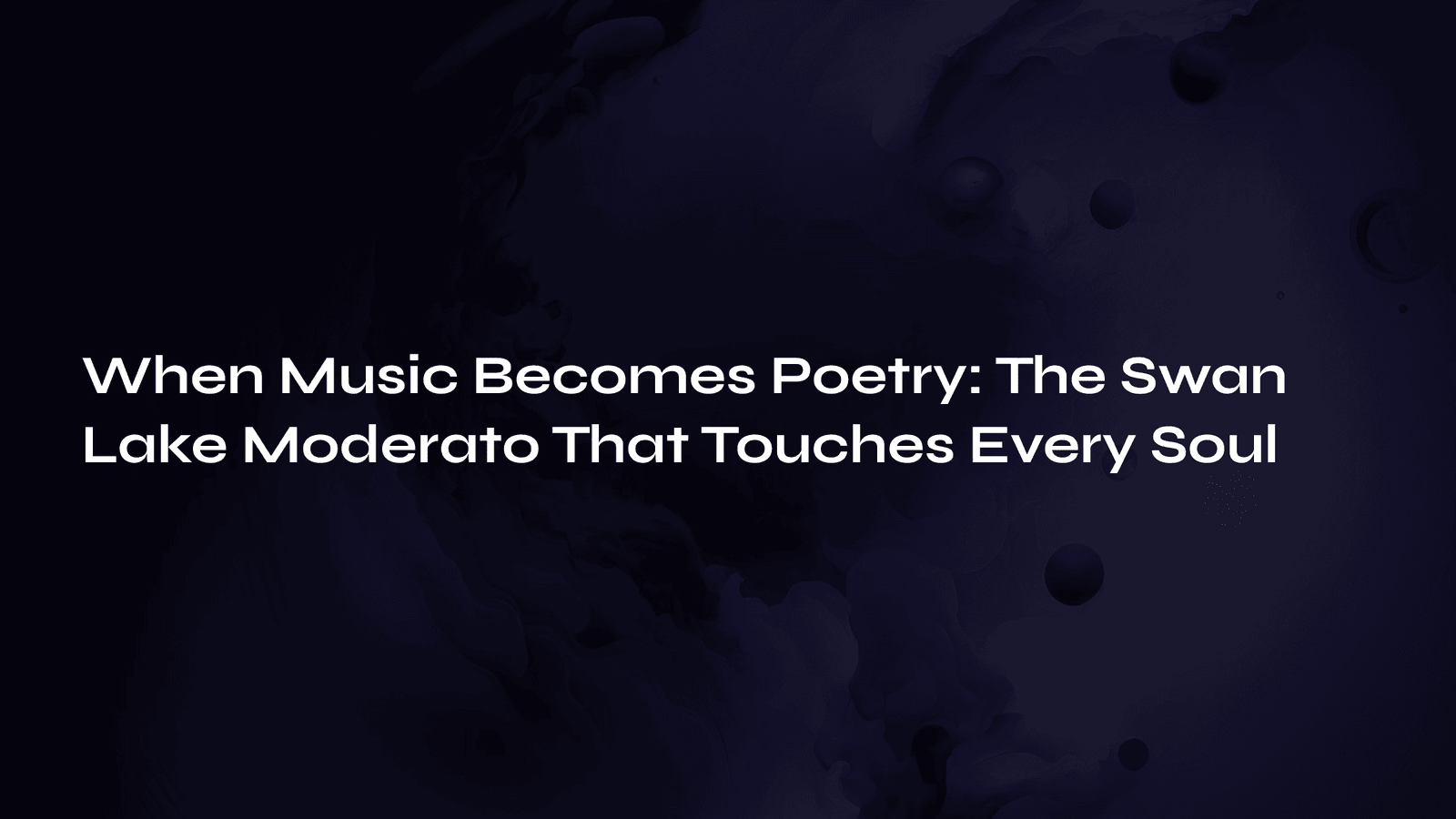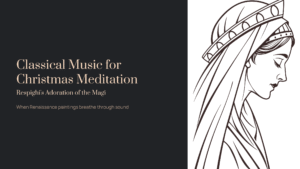Table of Contents

When Silence Becomes Sound
There’s something magical about those moments when music transcends mere notes and becomes pure emotion. I found myself thinking about this recently while listening to Tchaikovsky’s Swan Lake, specifically that hauntingly beautiful Moderato from Act II. You know the one – that melody that seems to float through the air like morning mist, carried by a lone oboe that speaks directly to your heart. It’s the kind of music that makes you pause whatever you’re doing and just… listen.
The funny thing about this particular piece is how it manages to tell an entire story without a single word. Every time I hear it, I’m transported to that moonlit lake where Princess Odette reveals her tragic secret. But even if you’ve never seen the ballet, even if you don’t know the story, this music still finds a way to move you. That’s the mark of true genius – when a composer can reach across centuries and touch something universal in the human experience.

The Man Behind the Magic
Pyotr Ilyich Tchaikovsky composed Swan Lake between 1875 and 1876, drawing inspiration from Russian and German folktales about enchanted swans. But here’s what makes this even more fascinating – when the ballet premiered in 1877, it was initially met with lukewarm reception. Can you imagine? This masterpiece that we now consider one of the greatest ballets ever created was once dismissed by critics and audiences alike.
The Moderato scene appears in Act II, at the pivotal moment when Prince Siegfried encounters Odette by the lake. This is where Tchaikovsky’s storytelling reaches its peak – the music doesn’t just accompany the narrative, it becomes the narrative. The composer uses what’s called a leitmotif technique, where the “Swan Theme” introduced in this movement becomes Odette’s musical identity throughout the entire ballet.
What strikes me most about Tchaikovsky’s approach here is how he understood that the most powerful moments in music often come from restraint rather than bombast. In an era where composers were writing increasingly complex and dramatic works, he chose simplicity and emotional directness.

The Architecture of Emotion
Let’s dive into what makes this movement so incredibly effective. The piece unfolds in A minor, and from the very first notes, you’re drawn into Odette’s world. The structure follows a classic ternary form, but it’s how Tchaikovsky fills this framework that creates the magic.
The opening is pure poetry – a solo oboe introduces that unforgettable melody over shimmering strings and delicate harp arpeggios. The oboe’s line is surprisingly simple, spanning just a sixth, but its plaintive quality immediately establishes Odette’s vulnerability. Meanwhile, the strings create this ethereal tremolo effect that perfectly captures the rippling surface of the lake. It’s like watching moonlight dance on water.
The middle section brings a shift to A major, introducing a warmer, more hopeful melody in the strings. This is where you can almost feel Odette’s momentary trust in Siegfried, that brief glimpse of possible redemption. The simplicity of this hymn-like passage contrasts beautifully with the chromatic tension of the opening, creating a sense of emotional breathing space.
But then comes the return – the oboe reprises its theme, now accompanied by more agitated string figures and subtle harmonic tensions. It’s as if the music itself is foreshadowing the tragedy to come. The beauty is still there, but it’s tinged with an inevitable sadness.
What’s particularly brilliant about Tchaikovsky’s orchestration here is what he doesn’t use. No brass, no percussion – just strings, harp, and winds. This creates an intimate, almost chamber music quality that focuses all attention on the melodic line and its emotional content.

A Personal Journey Through Sound
Every time I listen to this movement, I’m struck by how it seems to capture something essential about the human condition. There’s beauty and sadness intertwined in a way that feels almost too real. The oboe’s melody doesn’t just represent Odette – it represents all of us in our moments of vulnerability, when we’re caught between hope and despair.
I remember reading about Dan Williams, the Principal Oboist of the Pacific Northwest Ballet Orchestra, describing how this solo requires “pouring out all emotions.” That phrase really resonates with me because it captures what this music does – it pours out emotions in the most honest, unguarded way possible.
The genius of this movement lies in its ability to make you feel like you’re experiencing something deeply personal, even though it’s telling a story about a fictional princess cursed to be a swan. That’s the power of great art – it takes the specific and makes it universal.

How to Listen Like a Conductor
If you want to really appreciate this movement, here are some things to listen for that will enhance your experience. First, pay attention to the conversation between the oboe and the strings. They’re not just playing together – they’re having a dialogue, with the oboe as Odette’s voice and the strings as the magical, supernatural world around her.
Listen for the harp’s role in creating atmosphere. Those gentle arpeggios and glissandi aren’t just pretty sounds – they’re painting the magical transformation of swans into maidens. Every shimmer and cascade has a purpose.
Notice how Tchaikovsky uses silence and space. The pauses between phrases are just as important as the notes themselves. They create breathing room for the emotion to settle and resonate.
Try listening to different recordings to hear how conductors interpret the tempo. Some take it slower to emphasize the pathos, others maintain a more flowing pace that aligns with the ballet’s dance requirements. Each approach reveals different aspects of the music’s character.

The Eternal Swan
What makes Tchaikovsky’s Moderato from Swan Lake truly timeless is how it captures something fundamental about beauty and tragedy. Through its crystalline orchestration and achingly beautiful melodies, it tells us that some of the most profound emotions can’t be expressed in words – they require music.
This movement has transcended its original context to become a piece that speaks to anyone who has ever experienced loss, hope, or the bittersweet nature of love. Whether you encounter it in the concert hall, in a film score, or simply playing through your headphones on a quiet evening, it has the power to stop time and remind you of music’s ability to touch the deepest parts of the human soul.
The Swan Theme continues to ripple through our culture, appearing in everything from Darren Aronofsky’s “Black Swan” to countless orchestral arrangements and reinterpretations. Each generation finds something new in this music, which is perhaps the ultimate testament to Tchaikovsky’s genius.

If You Loved This, Listen to This Next
If you were moved by Tchaikovsky’s ability to weave profound emotion through delicate orchestration and haunting melodies in this Swan Lake Moderato, you might find yourself equally captivated by Beethoven’s Allegretto: When Eight Notes Changed Everything – where similar themes of beauty emerging from simplicity and the power of restraint create an intimate musical experience that resonates just as deeply across the centuries.
Both works reveal how the greatest composers understood that sometimes the most powerful emotions are expressed not through dramatic flourishes, but through quiet moments of pure, honest musical poetry that speaks directly to the heart.



